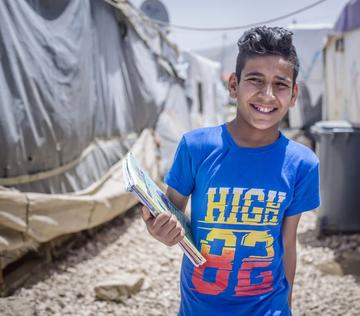
13-year old Siraj*was at risk of dropping out of school because he had to work to support his family with income. ��ɫ��Ƶsupported Siraj and his siblings so they could continue to attend school.
Keeping Learning Alive in Lebanon
Prior to the COVID-19 pandemic, school systems across Lebanon were already weak. Nearly 11% of elementary children were out-of-school while only 52% of those in school continued into secondary school.
Education is highly privatized across the country, with fewer than a third of school-aged children – often children from the poorest families and refugees – enrolled in public schools. Public schools in Lebanon suffer from under-qualified teaching staff and an inadequate learning environment and equipment, so that schooling for the poorest children is insufficient.
The weak public school system was not equipped to handle the influx of refugees from Syria into the country.
- There are more than 660,000 school-age Syrian refugees in Lebanon.
- More than half of these children are out of school.
- Refugee children are often out of school because of extreme poverty, inability to afford transport costs, lack of remedial classes, bullying and discrimination.
- An estimated 18,000 young Syrian refugees are engaged in child labor, preventing them from accessing education.
- The child marriage rate among Syrian refugees is officially 6% – although this may be significantly underestimated based on lack of data.
To attempt to combat these problems, the government of Lebanon is enrolling refugees in public schools using a two-shift system, with an afternoon shift specifically for refugee and non-Lebanese children. However, the economic crisis and the public protest that has gripped the country since October 2019 have added to the problem, with children previously enrolled in private schools being moved to the state system, increasing the burden on state schools. This could result in refugees being moved to a later shift, or see them drop out altogether.
Schools were closed nationwide in early March 2020 in response to COVID-19, affecting more than 1,360,000 learners. Schools will remain closed until the end of the academic year, with official exams cancelled.
School children across the country had already lost two months of this school year in October and November 2019 due to nationwide protests, meaning that they have lost over half of their school year.
A recent survey found that 40% of children aged 15–18 years old said that the situation is taking a toll on their mental health.
The Lebanese government has developed an online curriculum to allow for distance learning – however, a ��ɫ��Ƶstudy found that all children surveyed reported difficulties in studying online, and children who do not have internet access are missing out on their education. Further, it has been reported that online distance learning has not been made available to refugee children, who as a result will be left behind.
As the pandemic hits families’ finances, it is possible that many children will not return to school and that families will turn to child marriage and child labor to try and ease their economic difficulties. ��ɫ��Ƶis responding to this disruption in education by providing learning activities with pre-school children, school-attending students, and out-of-school children.
This includes distributing remote learning kits and training teachers and staff members on remote-teaching practices to ensure some form of learning for children during this period. We have also established WhatsApp groups for caregivers and students to get regular messages and tips on home schooling.
In the early days of the pandemic, ��ɫ��Ƶwas among the first to deliver critical supplies to health workers on the front lines of the coronavirus pandemic, as well as trusted information to reduce transmission and keep kids safe.
Our response includes training health teams worldwide how to protect themselves and prevent further spread of the disease. We are also supplying the personal protective equipment and other supplies frontline health staff desperately need. In addition, we are protecting children and families that may be separated due to quarantine.
Learn more about Save the Children’s coronavirus response in Lebanon and around the world.
Source: Save our Education
